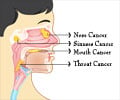Taking baby aspirin was found to improve overall survival patients with head & neck, lung cancer, stated new research.

TOP INSIGHT
Taking low-dose “baby” aspirin or other NSAIDs along with their cancer treatment increased survival by 8% at five years in this group of patients.
“This has already changed my practice,” notes Dr. Singh, who specializes in radiotherapy for patients with head/neck cancers. “We have now started to give all of our roughly 1,000 follow-up head-and-neck cancer patients this information and started to encourage them to have a discussion with their doctors about starting aspirin daily, as long as they are not on blood thinners. This is an exciting new avenue we are researching in other cancer types and designing new prospective clinical trials for.”
Austin Iovoli, MD, a trainee from the Jacobs School of Medicine and Biomedical Sciences at the University at Buffalo (UB), is first author on the study involving 460 patients who received chemotherapy and conventional radiation therapy as treatment for HNSCC.
“We were especially interested to see that these patients lived longer even though the anti-inflammatory drugs did not seem to have an impact on the effectiveness of cancer treatment,” notes Dr. Iovoli, who is serving a residency with Roswell Park’s Department of Supportive Care. The study in lung cancer examined data for 164 patients receiving stereotactic body radiation therapy (SBRT) for early-stage NSCLC. SBRT is a form of radiotherapy that involves precise delivery of radiation to tumors, using intense beams from several angles. This limits the exposure and, thus, the damage to nearby organs. It can be an effective treatment for cancer patients who may not benefit from surgery.
The retrospective study showed a substantial overall-survival advantage in patients taking aspirin and undergoing SBRT for early-stage lung cancer compared to those who were not. The median overall survival was 2.4 years versus 2 years, and two-year overall survival was 57% in patients taking aspirin versus 48% in patients not taking it.
“These studies provide further support for a growing body of literature that demonstrates a benefit for use of non-steroidal anti-inflammatory drugs, such as aspirin, by cancer patients,” says Gregory Hermann, MD, a resident physician in Radiation Medicine at Roswell Park and UB’s Jacobs School. “Although clinical trials are needed to make a definitive recommendation, we encourage patients to have a discussion with their doctor regarding the risks and potential benefits of aspirin use.”
Source-Newswise
 MEDINDIA
MEDINDIA




 Email
Email










